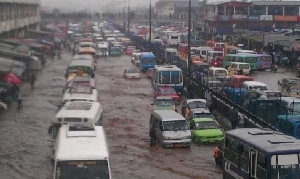History has an uncanny ability of repeating or reinventing itself. For the sages, the path to the future is better illuminated by a clearer and better understanding of the past or better put, history.
Industrialists insist accidents don’t happen by chance. They are rather triggered by a chain of events, often dereliction of duty and negligence, sometimes criminal, leading to needless loss of lives.
Accidents again don’t go on vacation. They are literally our second skin and we can’t jump out of them. After nearly 60 years of independence, I daresay Ghana is one of the few countries on earth where the proverbial wisdom of the ant hardly finds expression. We virtually still live in a state of nature. To put it mildly, life is still nasty, brutish and short in Ghana. We can only credit our survival to sheer providence. Our lives are like a cosmic roll of the dice in the hands of nature. We cannot conquer it. We have not even embraced science and technology since we hardly learn from history.
June 3 calamity
On June 3, 2015, scores of our compatriots perished on a day that should have passed off peacefully as nature blazed forth her blessings.
At the end of what should have calmed nerves, the country woke up to the heart-wrenching news of the death of scores of hapless citizens who had cluttered at a fuel station, seeking shelter and refuge from torrential rain.
Twelve months on, policy makers are yet to fashion out a policy to pre-empt recurrence. Successive governments, since the inception of the Fourth Republic, have time without number promised to contain the perennial flooding of the city without success. We don’t need rocket science to establish the cause of this annual calamity.
Factors of perennial flood
Building on watercourses, pollution of water bodies, siltation of storm drains and gutters and the failure of policy- makers to implement our laws through effective implementation, coupled with mundane sanctions regime among others are to blame.
Instead of profiting from the abundance of rainwater, we surprisingly throw our arms up in despair anytime it rains, as run-off water wash the top layer of the soil profile into nothingness.
The Ministry of Water Resources, Works and Housing should encourage and revive the colonial approach to water harvesting and conservation.
Water conservation has regrettably become a traditional/colonial relic. The few among us clinging onto the practice presently are free from the debilitating clutches of the Ghana Water Company Limited. Were we to stick to this practice as a way of life, or even as an acquired habit, half the challenges associated with flooding and shortages would be consigned to history.
Land management
Poor land management has similarly constrained development. Land, undeniably, is a factor of production. Regrettably, the reverse is what happens here. Buildings are sited just anyhow, questioning the resolve and determination of city planners to play by rules of the game. It appears nobody cares about how gas stations, for instance, are sometimes cited close to densely populated human settlements without a shred of caution.
And it does not appear we have taken a cue from the June 3, 2015 disaster. Fuel stations have proliferated with careless abandon, with little or no heed to human safety.
Environmentalists are of the conviction that until policy makers implement existing environmental laws, Ghana risks losing billions of dollars through poor planning, following our failure and inability to respond appropriately through policy directives, to contain the recurrent needless loss of lives, with each passing rainy season.
Opinions of Tuesday, 28 June 2016
Columnist: Nana Dwomoh Sarpong



















